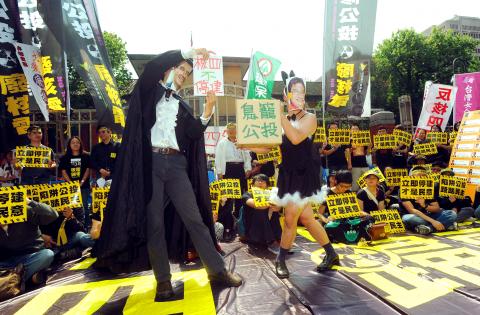The Executive Yuan yesterday said Taiwan will face electricity shortages, higher electricity rates and could invite international trade sanctions due to elevated carbon dioxide emissions if the incomplete Fourth Nuclear Power Plant in New Taipei City’s (新北市) Gongliao District (貢寮) is scrapped.
Halting construction of the controversial plant could also lead to a slump in the stock market and political and economic instability, the Executive Yuan said in a brochure compiled by the Ministry of Economic Affairs yesterday.
Written in a question-and-answer format, the brochure lists 25 arguments often raised by anti-nuclear activists to demand an immediate halt to the plant, followed by counterarguments.

Photo: Wang Yi-sung, Taipei Times
The pamphlet aims to convince the public that Taiwan needs to finish building the plant if it is to embark on a path to a low-carbon environment and a nuclear-free homeland.
According to the brochure, halting the project would put the nation at risk of having to ration electricity from 2015, when the unused capacity is estimated to be between 5 percent and 10 percent, with the risk intensifying to a real threat in 2018.
If the power plant does not become operational next year as scheduled, electricity prices will increase by 35 to 42 percent in 2016 and by 13 to 15 percent in 2018 compared with the rates recorded in October this year, the brochure says.
The Executive Yuan insisted that the plant is capable of producing the cheapest energy in Taiwan, at a price of less than NT$2 per kilowatt-hour, adding the costs of nuclear waste disposal and the decommissioning of the plant is included in the electricity price.
If the plant is abandoned, the nation would have to increase its reliance on fossil fuels — likely coal and gas — to meet electricity demand, the brochure says.
The problem of meeting the growing demand for energy cannot be immediately solved with alternative energy sources due to the various obstacles and difficulty of developing solar, wind or geothermal energy, the brochure says.
In that case, Taiwan wouid emit an additional of 7.51 million to 16.19 million tonnes of carbon dioxide per year, rendering it impossible for the country to reach its target of reducing emissions, the Executive Yuan said.
The brochure includes a section that seeks to address safety issues in which it rebutts an article published by Nature magazine in April 2011 that ranked two of Taiwan’s plants in a list of the world’s three most dangerous nuclear power plants.
The operational performance of Taiwan’s nuclear reactors have been rated above world standards by the International Atomic Energy Agency, it said.

Alain Robert, known as the "French Spider-Man," praised Alex Honnold as exceptionally well-prepared after the US climber completed a free solo ascent of Taipei 101 yesterday. Robert said Honnold's ascent of the 508m-tall skyscraper in just more than one-and-a-half hours without using safety ropes or equipment was a remarkable achievement. "This is my life," he said in an interview conducted in French, adding that he liked the feeling of being "on the edge of danger." The 63-year-old Frenchman climbed Taipei 101 using ropes in December 2004, taking about four hours to reach the top. On a one-to-10 scale of difficulty, Robert said Taipei 101

Nipah virus infection is to be officially listed as a category 5 notifiable infectious disease in Taiwan in March, while clinical treatment guidelines are being formulated, the Centers for Disease Control (CDC) said yesterday. With Nipah infections being reported in other countries and considering its relatively high fatality rate, the centers on Jan. 16 announced that it would be listed as a notifiable infectious disease to bolster the nation’s systematic early warning system and increase public awareness, the CDC said. Bangladesh reported four fatal cases last year in separate districts, with three linked to raw date palm sap consumption, CDC Epidemic Intelligence

Two Taiwanese prosecutors were questioned by Chinese security personnel at their hotel during a trip to China’s Henan Province this month, the Mainland Affairs Council (MAC) said yesterday. The officers had personal information on the prosecutors, including “when they were assigned to their posts, their work locations and job titles,” MAC Deputy Minister and spokesman Liang Wen-chieh (梁文傑) said. On top of asking about their agencies and positions, the officers also questioned the prosecutors about the Cross-Strait Joint Crime-Fighting and Judicial Mutual Assistance Agreement, a pact that serves as the framework for Taiwan-China cooperation on combating crime and providing judicial assistance, Liang

US climber Alex Honnold left Taiwan this morning a day after completing a free-solo ascent of Taipei 101, a feat that drew cheers from onlookers and gained widespread international attention. Honnold yesterday scaled the 101-story skyscraper without a rope or safety harness. The climb — the highest urban free-solo ascent ever attempted — took just more than 90 minutes and was streamed live on Netflix. It was covered by major international news outlets including CNN, the New York Times, the Guardian and the Wall Street Journal. As Honnold prepared to leave Taiwan today, he attracted a crowd when he and his wife, Sanni,